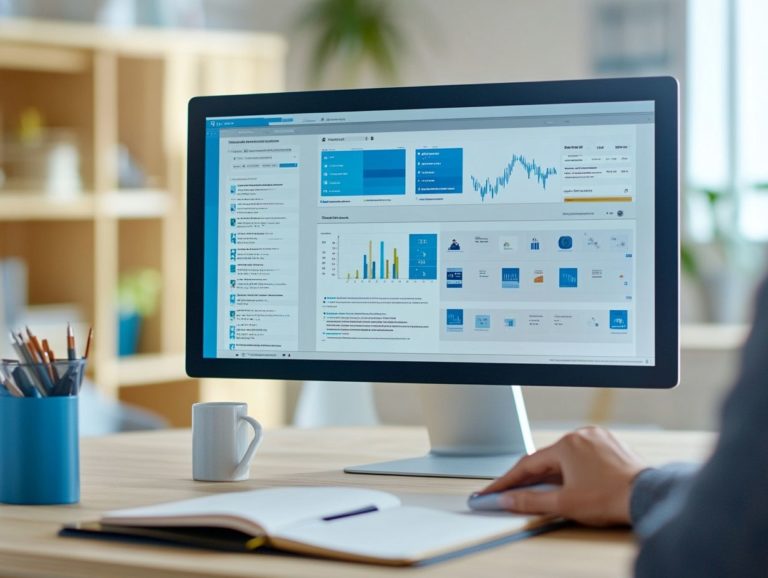What Are the Best Practices for Using CRM Software?
In today’s competitive landscape, mastering effective customer relationship management (CRM) is vital for building strong connections with your clients and propelling business growth.
This article delves into the realm of CRM software, covering its definition, core benefits, and crucial factors to consider when selecting the ideal system tailored to your needs.
It emphasizes best practices for implementation and outlines common pitfalls to avoid, ensuring you harness the full potential of your CRM strategy. Prepare to transform how you manage customer relationships!
Contents
- Key Takeaways:
- Understanding CRM Software
- Benefits of Using CRM Software
- Factors to Consider Before Choosing a CRM Software
- Best Practices for Implementing CRM Software
- Common Mistakes to Avoid When Using CRM Software
- Frequently Asked Questions
- What are the best practices for using CRM software?
- How can I ensure accurate and up-to-date data entry in my CRM software?
- What are the benefits of regularly cleaning and organizing data in CRM software?
- How can I integrate my CRM software with other business tools?
- Why is it important to regularly review and analyze data in my CRM software?
- Can anyone use CRM software, or does it require specialized knowledge?
Key Takeaways:

- Understand the purpose of CRM software and its benefits for improved customer relationships and increased efficiency.
- Consider your business needs and budget before choosing a CRM software.
- Best practices for implementing CRM software include setting goals, customizing to fit your business, training your team, and regularly reviewing and updating data.
Understanding CRM Software
Understanding CRM software is crucial for any business looking to elevate customer relationship management and streamline interactions.
CRM (Customer Relationship Management) helps businesses manage their interactions with customers, monitor sales performance, and refine data entry processes.
Solutions like Salesforce and Insightly showcase how CRM systems can be customized to suit your unique business needs, integrating customer data and harnessing cloud capabilities to enhance collaboration and efficiency.
Definition and Purpose
CRM is a powerful technology that enables you to manage your customer relationships and data with remarkable efficiency.
These systems streamline communication across various channels, ensuring that every interaction is meticulously recorded and analyzed. By incorporating automation, you can respond to customer inquiries swiftly and effectively, significantly enhancing overall satisfaction.
They also leverage customer feedback to refine your products and services, identify areas for improvement, and adapt your marketing strategies accordingly.
With customer segmentation, you can further tailor your outreach, crafting personalized experiences that resonate with distinct audience groups.
In essence, CRM systems not only enhance your customer interactions but also strengthen data validation processes, creating a cohesive strategy that drives growth.
Benefits of Using CRM Software
Leveraging CRM software unlocks a wealth of benefits for you as a business owner seeking to elevate customer relationships and enhance overall efficiency.
By integrating effective CRM systems, you can streamline your customer interactions, leading to improved sales performance and a sharper alignment with your customers’ needs.
These sophisticated technologies enhance your data management capabilities and offer valuable insights into customer behavior and preferences, ultimately driving your business efficiency and performance to new heights.
Improved Customer Relationships
One of the most significant advantages of adopting CRM software is the remarkable enhancement it brings to your customer relationships. This software captures invaluable insights into customer preferences and behaviors, paving the way for more personalized interactions.
By leveraging customer feedback through surveys and conversations, you can customize your services to adapt to their ever-changing demands. Data analytics plays a pivotal role here, offering actionable insights that sharpen your marketing strategies and elevate service delivery.
When these elements come together, they foster a deeper connection between your company and its clients, ultimately driving increased loyalty and satisfaction. A robust CRM system transcends mere interaction tracking; it becomes a vital catalyst for nurturing enduring customer relationships.
Increased Efficiency and Productivity
CRM software can dramatically enhance your efficiency and productivity by automating tedious tasks and streamlining workflows.
This automation allows you to spend far less time on repetitive data entry, freeing up valuable energy to focus on nurturing customer relationships and closing deals.
The available customization options let you tailor the CRM functionalities to fit your unique sales pipeline, ensuring seamless integration with your specific goals.
To fully unlock the potential of these automation features, you and your team must receive proper training. This training will equip you with the skills needed to navigate the system confidently, leading to greater adoption and more effective use of CRM tools.
Factors to Consider Before Choosing a CRM Software

When choosing CRM software, consider various factors that align with your business needs and budget.
Understand your organization s specific requirements desired features, customization options, and integration capabilities are essential for guiding your decision-making process.
Assess your budget to ensure the CRM solution meets your needs and offers good value.
Business Needs and Budget
Evaluating your business needs and budget is crucial for selecting the right CRM software. Start by breaking down your specific requirements, including customer segmentation, sales tracking, and integration with financial systems.
By understanding your organization s unique challenges and goals, you can prioritize the features that best address those needs. Establishing budget constraints early will help narrow down your options and ensure you invest in a CRM that meets operational demands and aligns with financial parameters.
This thoughtful assessment will lead to a more informed decision, significantly enhancing your customer relationship management.
Best Practices for Implementing CRM Software
Ready to transform your business? Implement CRM software effectively with these best practices that highlight what features CRM software should have to promote seamless integration and usage throughout your organization.
To maximize the benefits of CRM adoption, define clear goals and objectives that align with your strategic vision. Customizing the software to meet your specific business needs and providing thorough employee training is crucial for ensuring your teams can leverage the CRM system to its fullest potential.
1. Define Your Goals and Objectives
Defining clear goals and objectives is the first step toward successfully implementing CRM software. Setting specific and measurable targets paves the way for enhanced performance throughout the customer engagement process.
By focusing on these intended outcomes, your CRM software can effectively streamline the collection of customer feedback and data entry, ensuring that every interaction adds value to your business model.
This approach not only nurtures better customer relationships but also impacts your return on investment (ROI) directly. Leveraging your CRM capabilities to deepen customer insights allows you to make informed adjustments, leading to increased satisfaction and loyalty.
2. Customize the Software to Fit Your Business
Customizing your CRM software to meet your unique business needs is essential for unlocking its full potential. By harnessing user-friendly features, you can tailor interfaces and dashboards to showcase the customer data most relevant to your team. This ensures that everyone has easy access to the information they require.
Automation capabilities can help streamline repetitive tasks. This allows your sales team to concentrate on fostering relationships instead of getting weighed down by manual data entry. These systems can be configured to send personalized communications to clients based on specific triggers or milestones. This significantly boosts your overall sales performance.
With the right customization, you can enhance operational efficiency and derive insights that lead to improved customer engagement.
3. Train Your Team on How to Use the Software
Effective employee training is crucial for successful CRM adoption. This maximizes its impact on customer interactions.
To make the most of CRM systems, prioritize clear and structured training sessions. These should delve deeply into not just the basics but also the intricacies of methods to analyze customer data and the various stages of the sales pipeline.
This comprehensive approach ensures team members can effectively track customer engagement and analyze data. Ultimately, this drives better decision-making.
Incorporating ongoing support is vital for smooth navigation of challenges. It fosters an environment where feedback can flourish.
Regular check-ins and open channels for communication enable employees to share their experiences. This continuously enhances their skills and boosts their confidence in leveraging CRM functionalities.
4. Regularly Review and Update Your Data

Make it a priority to regularly review and update your data it s crucial for success!
In today s fast-paced business environment, continuous data validation is essential. This ensures your customer information stays accurate and relevant. This practice sharpens your customer segmentation strategies and boosts the overall performance of your financial systems.
By keeping a vigilant eye on data quality, you lay down a reliable foundation for effective analytics and well-considered choices.
Inaccurate or outdated customer records can easily lead to misguided strategies and missed opportunities. This can ultimately undermine your competitive advantage.
For businesses striving for growth, investing in robust data management and validation processes is key to unlocking the full potential of your customer insights.
Common Mistakes to Avoid When Using CRM Software
When implementing and utilizing CRM software, steering clear of common pitfalls is essential. Doing so allows you to fully maximize its benefits and ensure user satisfaction.
1. Not Utilizing All Features
Neglecting to fully utilize the features of your CRM software can seriously hinder its effectiveness and return on investment.
By diving into and leveraging various functionalities like automation and customization you can tailor the system to fit your specific business needs. This will ultimately enhance your overall sales performance.
Automation can streamline your data entry processes, cutting down on the time spent on tedious tasks. This allows your sales team to concentrate on what really matters: building relationships and closing deals.
Customization options enable you to align the CRM with your unique workflows. This ensures that critical information is not just accessible but also actionable.
By tapping into these capabilities, you maximize efficiency and enhance decision-making. This supports sustained growth for your business.
Start implementing these tips today to elevate your CRM experience!
2. Neglecting to Update and Maintain Data
Neglecting to update and maintain the data within your CRM system can lead to inaccuracies, which can strain your relationships with customers.
These inaccuracies can create confusion among your team, resulting in misunderstandings and missed opportunities. This directly affects customer satisfaction. When clients encounter delays or receive incorrect information, they may feel undervalued, which can ultimately erode their brand loyalty.
Without regular data validation, you risk diminishing operational efficiency. This makes it difficult to analyze customer feedback effectively. Such stagnation can hinder growth, as insights drawn from accurate data are essential for refining your services and tailoring your offerings to meet customer needs.
By implementing robust data maintenance protocols, you help you focus on delivering great customer service.
3. Failing to Communicate Changes and Updates to Team Members
Failing to tell your team about changes and updates can lead to confusion and diminish the effectiveness of your CRM system.
When updates are rolled out without proper notification, your employees may find themselves struggling to adapt. This may disrupt customer interactions and the sales process.
Establishing clear communication practices is essential not only to keep everyone in the loop but also to enable your team to fully embrace the CRM system.
A well-informed team can effectively leverage the tools at their disposal, resulting in improved client relationships and operations.
By incorporating these changes into employee training, you reinforce best practices and ensure that everyone is aligned with the company’s objectives.
Frequently Asked Questions
What are the best practices for using CRM software?

The best practices for using CRM software include:
- Defining clear goals and objectives for using the software
- Ensuring accurate and up-to-date data entry
- Regularly cleaning and organizing data
- Providing proper training to all users
- Integrating the software with other business tools
- Regularly reviewing and analyzing data to make informed decisions
How can I ensure accurate and up-to-date data entry in my CRM software?
To ensure accurate and up-to-date data entry, set guidelines and protocols. Provide proper training to all users and regularly review and clean data. Automating data entry processes where possible is also helpful, along with having a designated person responsible for maintaining data accuracy.
What are the benefits of regularly cleaning and organizing data in CRM software?
Regularly cleaning and organizing data can improve overall data quality, increase efficiency, and provide accurate insights for decision-making. It also helps avoid duplicate or outdated information, which can lead to errors and confusion.
How can I integrate my CRM software with other business tools?
Most CRM software offers integration capabilities with other business tools such as email platforms, project management software, and accounting software. Explore and utilize these integration options to streamline processes, improve communication, and enhance data accuracy.
Why is it important to regularly review and analyze data in my CRM software?
Regularly reviewing and analyzing data allows businesses to identify patterns, trends, and customer behaviors, which can inform sales and marketing strategies. It also helps track progress toward goals and make data-driven decisions for business growth.
Can anyone use CRM software, or does it require specialized knowledge?
While CRM software can be used by anyone, having some basic technical knowledge and receiving proper training to fully utilize its capabilities is beneficial. Many CRM software providers also offer customer support and resources to help users navigate the system effectively.






